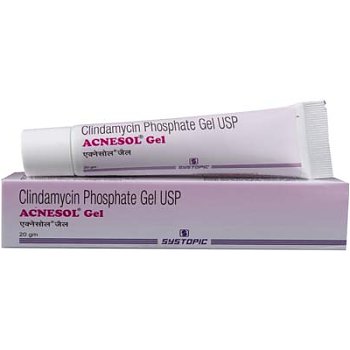What is Acnesol 1% Gel?
Acnesol 1% gel is an anti-bacterial medicine used to treat acne vulgaris. It treats acne, which appears as pimples or spots on your back, face, or chest.
This Gel contains Clindamycin that fights against bacteria responsible for causing acne.
It is commonly used to manage different forms of acne, including whiteheads, pimples, and blackheads.
Acnesol gel manages mild to moderate acne and can be used by both adults & teenagers. This medication helps to unclog pores, stop new breakouts, and promote clear skin.
Uses of Acnesol 1% Gel
Doctors prescribe this medicine for:
-
Treatment of Acne Vulgaris
Acne Vulgaris is a common skin condition that happens when your hair follicles get blocked with dead skin cells and oil.
Symptoms of Acne Vulgaris include pimples, whiteheads, tender bumps, blackheads, small red bumps and pus-filled lumps on skin.
Manufacturer of Acnesol 1% Gel
Systopic Laboratories Pvt. Ltd., a well-known pharmaceutical company, manufactures Acnesol 1% Gel.
Working mechanism of Acnesol 1% gel
Acnesol gel contains Clindamycin, which belongs to antibiotics, as its active ingredient.
This medicine works by stopping the synthesis of vital proteins needed by bacteria to carry out essential functions.
Therefore, it stops bacteria from growing and prevents infection from spreading.
How to use Acnesol 1% gel?
Cleanse affected area with a gentle cleanser or face wash and pat it dry before you apply Acnesol 1% gel.
Take a small amount of Gel on your fingertips and then apply a thin layer to your affected area. Avoid damaged or broken skin.
Gently massage this medicine into your skin unless it is entirely absorbed in the skin.
Wash your hands after applying this Gel to avoid spreading it to other areas or accidentally touching your eyes or mouth.
This Gel is used once a day as directed by your doctor. Increasing the dose will not offer you quick results.
If you experience any discomfort or irritation, then reduce the frequency of application or discuss it with the doctor.
How to best incorporate Acnesol gel in your skincare regime, you must consult a doctor for personalized advice.
This Gel can cause minor burning, irritation, or stinging when applied. Inform doctor if this problem does not go away.
Your doctor will decide the correct dose and duration of Acnesol 1% gel based on your age, body weight, and disease condition.
Precautions and warnings for Acnesol 1% gel
Acnesol 1% gel should not be used if you are allergic to it or Clindamycin or have any other allergies.
This medication might contain some inactive ingredients, which can cause allergic reactions. Pregnant and breastfeeding women should use this Gel only after consulting with a doctor.
Before starting your treatment with this medicine, let doctor know about your medical history, especially of:
- Liver disease
- Kidney disorder
- Problems with bowels
Let the doctor know if you have ever had bloody diarrhea caused by taking antibiotics or using any other medicines to treat skin disorders.
Maintain a balanced diet rich in whole grains, fruits, and vegetables to support your overall skin health.
You must avoid picking or popping pimples to prevent further inflammation and scarring.Avoid excessive sun exposure and use effective sunscreen with SPF to protect your skin.
Side effects of Acnesol 1% gel
Remember, the doctor has prescribed this medicine because he thinks its benefits are more significant when compared to side effects.
Common side effects like burning, minor itching, or redness of skin & oily skin can be seen in some people.
However, common side effects of this medication start to disappear after some time when your body adjusts to Clindamycin.
Other side effects of Acnesol 1% gel include:
- Abdominal pain
- Diarrhea
- Scaling, pain, dryness, and skin irritation at application site
- Antibiotic-associated colitis
- Bloody or severe diarrhea
Get emergency medical help if your side effects persist or worsen with time.
Interactions
Drug interaction can alter benefits of Acnesol 1% gel or affect working mechanism of this medicine.
Without a doctor’s approval, do not start, stop, or change the dosage of any medications.
If you use other products like prescription & non-prescription drugs and herbal supplements, let the doctor know.
To avoid drug interactions, you must avoid taking following medicines with Acnesol 1% Gel:
- Retinoids
- Benzoyl peroxide
- Rocuronium
- Other anti-acne, topical agents
Storage
It is suggested to store Acnesol 1% gel at room temperature, away from direct sunlight and moisture.
Frequently asked questions about Acnesol 1% gel (FAQs)
-
How long do I need to use Acnesol 1% gel?
Use Acnesol 1% gel as long as the doctor recommends you. Generally, this medicine should be used for a maximum of 12 weeks.
-
Is Acnesol 1% Gel effective?
When used in dose and duration as advised by a doctor, Acnesol 1% gel is effective. Stopping this medicine too early can make the symptoms return or worsen.
